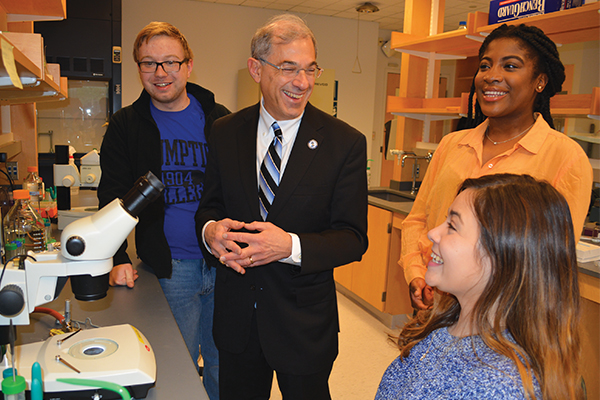 Since its founding, Assumption has endured as an institution of resilience. This resilience has manifested itself at critical junctures in the life of the institution where bold decisions were necessary in response to situations that had consequences for Assumption’s future: the decision to transition from a six-year program comprised of the prep school with two years of institution to a separate four-year degree-granting institution; the decision to rebuild and move after the 1953 tornado; transitioning from teaching all courses in French to English; becoming a coeducational institution with the admission of women; and the expansion of academic programs beyond the liberal arts, beginning with Business Studies. In each of these instances, Assumption recognized the need to adapt by responding to enrollment realities, changing interests among prospective students, and the need to be innovative. Not only did Assumption adapt in each case, but it endured and thrived.
Since its founding, Assumption has endured as an institution of resilience. This resilience has manifested itself at critical junctures in the life of the institution where bold decisions were necessary in response to situations that had consequences for Assumption’s future: the decision to transition from a six-year program comprised of the prep school with two years of institution to a separate four-year degree-granting institution; the decision to rebuild and move after the 1953 tornado; transitioning from teaching all courses in French to English; becoming a coeducational institution with the admission of women; and the expansion of academic programs beyond the liberal arts, beginning with Business Studies. In each of these instances, Assumption recognized the need to adapt by responding to enrollment realities, changing interests among prospective students, and the need to be innovative. Not only did Assumption adapt in each case, but it endured and thrived.
Assumption finds itself at another critical juncture as the higher education industry faces significant challenges: the continued decline in the number of high school students, the increasing cost of higher education, families who question whether a college degree is worth the investment, and skepticism regarding the relevance of the liberal arts in the 21st century. These challenges have forced the closure or merger of many small, private institutions at an alarming pace.
Recognizing these realities, Assumption began proactively planning for these changes in higher education to ensure that we endure and thrive well into the future. During this reflection, it became evident that our current structure did not accurately reflect Assumption’s varied academic offerings, from traditional liberal arts and sciences to pre-professional programs, as well as graduate programs. With the addition of nursing and physician assistant studies, as well as the growth of faculty student research, it was clear that Assumption most closely resembles a comprehensive university as opposed to a strictly liberal arts institution. Therefore, we have begun a process to apply for university status with the Massachusetts Board of Higher Education.
Separate schools will facilitate cohesion around common disciplinary approaches, goals, and learning experiences that are integrated and related to an overall philosophy of the educational outcomes desired in a particular school. This will provide students a more focused and comprehensive academic experience that revolves around related disciplinary perspectives. These learning outcomes will be linked to the liberal arts Core Curriculum as the foundation upon which each school relates its overall mission to that of the institution, providing the unifying and common element of the education that students receive while at Assumption. In this way, our commitment to the Catholic, liberal arts tradition will have greater prominence.
Innovation, creativity, flexibility, and “first to market” are essential to remain competitive. Such goals are more easily accomplished in separate schools since the faculty in the school possess the expertise within the disciplines to engage in innovative collaboration. The school structure provides faculty a greater voice since they, along with the dean, determine the direction of their school.
By establishing separate schools, Assumption may more effectively leverage its strengths, more easily develop new course options and programs, and allow us to be inventive as we adapt, endure, and thrive in this changing landscape of higher education without sacrificing the essence of who we are, maintaining the best of what Assumption offers its students.
Francesco C. Cesareo, Ph.D.
PRESIDENT


